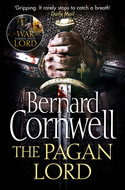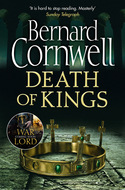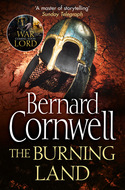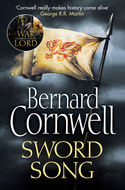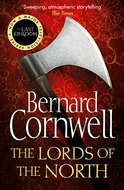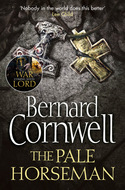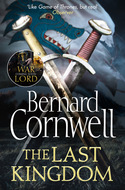Kitap dosya olarak indirilemez ancak uygulamamız üzerinden veya online olarak web sitemizden okunabilir.
Kitabı oku: «The Last Kingdom Series Books 1-6», sayfa 22
Eleven
Ealdorman Odda did not want to kill Danes. He wanted to stay where he was and let Ubba’s forces besiege him. That, he reckoned, would be enough. ‘Keep their army here,’ he said heavily, ‘and Alfred can march to attack them.’
‘Alfred,’ I pointed out, ‘is besieging Exanceaster.’
‘He will leave men there to watch Guthrum,’ Odda said loftily, ‘and march here.’ He did not like talking to me, but I was an Ealdorman and he could not bar me from his council of war that was attended by his son, the priests and a dozen thegns, all of whom were becoming irritated by my comments. I insisted Alfred would not come to our relief, and Ealdorman Odda was refusing to move from the hilltop because he was sure Alfred would come. His thegns, all of them big men with heavy coats of mail and grim, weather-hardened faces, agreed with him. One muttered that the women had to be protected.
‘There shouldn’t be any women here,’ I said.
‘But they are here,’ the man said flatly. At least a hundred women had followed their men and were now on the hilltop where there was no shelter for them or their children.
‘And even if Alfred comes,’ I asked, ‘how long will it take?’
‘Two days?’ Odda suggested. ‘Three?’
‘And what will we drink while he’s coming?’ I asked. ‘Bird piss?’
They all just stared at me, hating me, but I was right for there was no spring on Cynuit. The nearest water was the river, and between us and the river were Danes, and Odda understood well enough that we would be assailed by thirst, but he still insisted we stay. Perhaps his priests were praying for a miracle.
The Danes were just as cautious. They outnumbered us, but not by many, and we held the high ground which meant they would have to fight up Cynuit’s steep slope, and so Ubba chose to surround the hill rather than assault it. The Danes hated losing men, and I remembered Ubba’s caution at the Gewæsc where he had hesitated to attack Edmund’s forces up the two paths from the marsh, and perhaps that caution was reinforced by Storri, his sorcerer, if Storri still lived. Whatever the reason, instead of forming his men into the shield wall to assault the ancient fort, Ubba posted them in a ring about Cynuit and then, with five of his shipmasters, climbed the hill. He carried no sword or shield which showed he wanted to talk.
Ealdorman Odda, his son, two thegns and three priests went to meet Ubba and, because I was an Ealdorman, I followed them. Odda gave me a malevolent look, but again he was unable to deny me, and so we met halfway down the slope where Ubba offered no greeting and did not even waste time on the usual ritual insults, but pointed out that we were trapped and that our wisest course was to surrender. ‘You will give up your weapons,’ he said, ‘I shall take hostages, and you will all live.’
One of Odda’s priests translated the demands to the Ealdorman. I watched Ubba. He looked older than I remembered, with grey hairs among the black tangle of his beard, but he was still a frightening man; huge chested, confident and harsh.
Ealdorman Odda was plainly frightened. Ubba, after all, was a renowned Danish chieftain, a man who had ranged across long seas to give great slaughter, and now Odda was forced to confront him. He did his best to sound defiant, retorting that he would stay where he was and put his faith in the one true God.
‘Then I shall kill you,’ Ubba answered.
‘You may try,’ Odda said.
It was a feeble response and Ubba spat in scorn. He was about to turn away, but then I spoke and needed no interpreter. ‘Guthrum’s fleet is gone,’ I said. ‘Njorð reached from the deep, Ubba Lothbrokson, and he snatched Guthrum’s fleet down to the seabed. All those brave men are gone to Ran and Ægir.’ Ran was Njorð’s wife and Ægir, the giant who guarded the souls of drowned men. I brought out my hammer charm and held it up. ‘I speak the truth, Lord Ubba,’ I said. ‘I watched that fleet die and I saw its men go under the waves.’
He stared at me with his flat, hard eyes and the violence in his heart was like the heat of a forge. I could feel it, but I could also sense his fear, not of us, but of the gods. He was a man who did nothing without a sign from the gods, and that was why I had talked of the gods when I spoke about the fleet’s drowning. ‘I know you,’ he growled, pointing at me with two fingers to avert the evil of my words.
‘And I know you, Ubba Lothbrokson,’ I said, and I let go of the charm and held up three fingers. ‘Ivar dead,’ I folded one finger down, ‘Halfdan dead,’ the second finger, ‘and only you are left. What did the runes say? That by the new moon there will be no Lothbrok brother left in Midgard?’
I had touched a nerve, as I intended to, for Ubba instinctively felt for his own hammer charm. Odda’s priest was translating, his voice a low murmur, and the Ealdorman was staring at me with wide astonished eyes.
‘Is that why you want us to surrender?’ I asked Ubba. ‘Because the runesticks tell you we cannot be killed in battle?’
‘I shall kill you,’ Ubba said. ‘I shall cut you from your crotch to your gullet. I shall spill you like offal.’
I made myself smile, though that was hard when Ubba was making threats. ‘You may try, Ubba Lothbrokson,’ I said, ‘but you will fail. And I know. I cast the runes, Ubba, I cast the runes under last night’s moon, and I know.’
He hated it, for he believed my lie. He wanted to be defiant, but for a moment he could only stare at me in fear because his own runesticks, I guessed, had told him what I was telling him, that any attack on Cynuit would end in failure. ‘You’re Ragnar’s boy,’ he said, placing me at last.
‘And Ragnar the Fearless speaks to me,’ I said, ‘he calls from the corpse-hall, he wants vengeance, Ubba, vengeance on the Danes, for Ragnar was killed treacherously by his own folk. I’m his messenger now, a thing from the corpse-hall, and I have come for you.’
‘I didn’t kill him!’ Ubba snarled.
‘Why should Ragnar care?’ I asked. ‘He just wants vengeance and to him one Danish life is as good as another, so cast your runes again and then offer us your sword. You are doomed, Ubba.’
‘And you’re a piece of weasel shit,’ he said and said no more, but just turned and hurried away.
Ealdorman Odda was still staring at me. ‘You know him?’ he asked.
‘I’ve known Ubba since I was ten years old,’ I said, watching the Danish chieftain walk away. I was thinking that if I had a choice, that if I could follow my warrior’s heart, I would rather fight alongside Ubba than against him, but the spinners had decreed otherwise. ‘Since I was ten,’ I went on, ‘and the one thing I know about Ubba is that he fears the gods. He’s terrified now. You can attack him and his heart will let him down because he thinks he will lose.’
‘Alfred will come,’ Odda said.
‘Alfred watches Guthrum,’ I said. I was not certain of that, of course. For all I knew Alfred could be watching us now from the hills, but I doubted he would leave Guthrum free to plunder Wessex. ‘He watches Guthrum,’ I said, ‘because Guthrum’s army is twice as large as Ubba’s. Even with his fleet half drowned, Guthrum has more men, and why would Alfred let them loose from Exanceaster? Alfred won’t come,’ I finished, ‘and we shall all die of thirst before Ubba attacks us.’
‘We have water,’ his son said sulkily, ‘and ale.’ He had been watching me resentfully, awed that I had spoken so familiarly with Ubba.
‘You have ale and water for a day,’ I said scornfully and saw from the Ealdorman’s expression that I was right.
Odda turned and stared south down the Pedredan’s valley. He was hoping to see Alfred’s troops, yearning for a glimpse of sunlight on spear heads, but of course there was nothing there except the trees stirring in the wind.
Odda the Younger sensed his father’s uncertainty. ‘We can wait for two days,’ he urged.
‘Death will be no better after two days,’ Odda said heavily. I admired him then. He had been hoping not to fight, hoping that his king would rescue him, but in his heart he knew I was right and knew that these Danes were his responsibility and that the men of Defnascir held England in their hands and must preserve it. ‘Dawn,’ he said, not looking at me. ‘We shall attack at dawn.’
We slept in war gear. Or rather men tried to sleep when they were wearing leather or mail, with sword belts buckled, helmets and weapons close, and we lit no fires for Odda did not want the enemy to see that we were readied for battle, but the enemy had fires, and our sentries could watch down the slopes and use the enemy’s light to look for infiltrators. None came. There was a waning moon sliding in and out of ragged clouds. The Danish fires ringed us, heaviest to the south by Cantucton where Ubba camped. More fires burned to the east, beside the Danish ships, the flames reflecting off the gilded beast-heads and painted dragon prows. Between us and the river was a meadow at the far side of which the Danes watched the hill, and beyond them was a wide stretch of marsh and at the marsh’s far side was a strip of firmer land beside the river where some hovels offered the Danish ship-guards shelter. The hovels had belonged to fishermen, long fled, and fires were lit between them. A handful of Danes paced the bank beside those fires, walking beneath the carved prows and I stood on the ramparts and gazed at those long, graceful ships and prayed that Wind-Viper still lived.
I could not sleep. I was thinking of shields and Danes and swords and fear. I was thinking of my child that I had never seen and of Ragnar the Fearless, wondering if he watched me from Valhalla. I was worrying that I would fail next day when, at last, I came to the life-gate of a shield wall, and I was not the only one denied sleep for, at the heart of the night, a man climbed the grassy rampart to stand beside me and I saw it was Ealdorman Odda. ‘How do you know Ubba?’ he asked.
‘I was captured by the Danes,’ I said, ‘and was raised by them. The Danes taught me to fight.’ I touched one of my arm rings. ‘Ubba gave me this one.’
‘You fought for him?’ Odda asked, not accusingly, but with curiosity.
‘I fought to survive,’ I said evasively.
He looked back to the moon-touched river. ‘When it comes to a fight,’ he said, ‘the Danes are no fools. They will be expecting an attack at dawn.’ I said nothing, wondering whether Odda’s fears were changing his mind. ‘And they outnumber us,’ he went on.
I still said nothing. Fear works on a man, and there is no fear like the prospect of confronting a shield wall. I was filled with fear that night, for I had never fought man to man in the clash of armies. I had been at Æsc’s Hill, and at the other battles of that far off summer, but I had not fought in the shield wall. Tomorrow, I thought, tomorrow, and like Odda I wanted to see Alfred’s army rescue us, but I knew there would be no rescue. ‘They outnumber us,’ Odda said again, ‘and some of my men have nothing but reaping hooks as weapons.’
‘A reaping hook can kill,’ I said, though it was a stupid thing to say. I would not want to face a Dane if I carried nothing but a reaping hook. ‘How many have proper weapons?’ I asked.
‘Half?’ he guessed.
‘Then those men are our front ranks,’ I said, ‘and the rest pick up weapons from the enemy dead.’ I had no idea what I was speaking of, but only knew I must sound confident. Fear might work on a man, but confidence fights against fear.
Odda paused again, gazing at the dark ships below. ‘Your wife and son are well,’ he said after a while.
‘Good.’
‘My son merely rescued her.’
‘And prayed I was dead,’ I said.
He shrugged. ‘Mildrith lived with us after her father’s death and my son became fond of her. He meant no harm and he gave none.’ He held a hand out to me and I saw, in the small moonlight, that he offered me a leather purse. ‘The rest of the bride price,’ he said.
‘Keep it, lord,’ I said, ‘and give it to me after the battle, and if I die, give it to Mildrith.’
An owl went overhead, pale and fast, and I wondered what augury that was. Far off to the east, up the coast, far beyond the Pedredan, a tiny fire flickered and that too was an augury, but I could not read it.
‘My men are good men,’ Odda said, ‘but if they are outflanked?’ Fear was still haunting him. ‘It would be better,’ he went on, ‘if Ubba were to attack us.’
‘It would be better,’ I agreed, ‘but Ubba will do nothing unless the runesticks tell him to do it.’
Fate is all. Ubba knew that, which is why he read the signs from the gods, and I knew the owl had been a sign, and it had flown over our heads, across the Danish ships and gone towards that distant fire burning along the Sæfern’s shore, and I suddenly remembered King Edmund’s four boats coming to the East Anglian beach and the fire-arrows thumping into the beached Danish ships and I realised I could read the auguries after all. ‘If your men are outflanked,’ I said, ‘they will die. But if the Danes are outflanked, they will die. So we must outflank them.’
‘How?’ Odda asked bitterly. All he could see was slaughter in the dawn; an attack, a fight and a defeat, but I had seen the owl. The owl had flown from the ships to the fire, and that was the sign. Burn the ships. ‘How do we outflank them?’ Odda asked.
And still I remained silent, wondering if I should tell him. If I followed the augury it would mean splitting our forces, and that was the mistake the Danes had made at Æsc’s Hill, and so I hesitated, but Odda had not come to me because he suddenly liked me, but because I had been defiant with Ubba. I alone on Cynuit was confident of victory, or seemed to be, and that, despite my age, made me the leader on this hill. Ealdorman Odda, old enough to be my father, wanted my support. He wanted me to tell him what to do, me who had never been in a great shield wall, but I was young and I was arrogant and the auguries had told me what must be done, and so I told Odda.
‘Have you ever seen the sceadugengan?’ I asked him.
His response was to make the sign of the cross.
‘When I was a child,’ I said, ‘I dreamed of the sceadugengan. I went out at night to find them and I learned the ways of the night so I could join them.’
‘What has that to do with the dawn?’ he asked.
‘Give me fifty men,’ I said, ‘and they will join my men and at dawn they will attack there.’ I pointed towards the ships. ‘We’ll start by burning their ships.’
Odda looked down the hill at the nearer fires which marked where the enemy sentries were posted in the meadow to our east. ‘They’ll know you’re coming,’ he said, ‘and be ready for you.’ He meant that a hundred men could not cross Cynuit’s skyline, go downhill, break through the sentries and cross the marsh in silence. He was right. Before we had gone ten paces the sentries would have seen us and the alarm would be sounded and Ubba’s army, that was surely as ready for battle as our own, would stream from its southern encampment to confront my men in the meadow before they reached the marsh.
‘But when the Danes see their ships burning,’ I said, ‘they will go to the river’s bank, not to the meadow. And the riverbank is hemmed by marsh. They can’t outflank us there.’ They could, of course, but the marsh would give them uncertain footing so it would not be so dangerous as being outflanked in the meadow.
‘But you will never reach the riverbank,’ he said, disappointed in my idea.
‘A Shadow-Walker can reach it,’ I said.
He looked at me, said nothing.
‘I can reach it,’ I said, ‘and when the first ship burns every Dane will run to the bank, and that’s when the hundred men make their charge. The Danes will be running to save their ships, and that will give the hundred men time to cross the marsh. They go as fast as they can, they join me, we burn more ships, and the Danes will be trying to kill us.’ I pointed to the riverbank, showing where the Danes would go from their camp along the strip of firm ground to where the ships were beached, ‘and when the Danes are all on that bank,’ I went on, ‘between the river and the marsh, you lead the fyrd to take them in the rear.’
He brooded, watching the ships. If we attacked at all then the obvious place was down the southern slope, straight into the heart of Ubba’s forces, and that would be a battle of shield wall against shield wall, our nine hundred men against his twelve hundred, and at the beginning we would have the advantage for many of Ubba’s men were posted around the hill and it would take time for those men to hurry back and join the Danish ranks, and in that time we would drive deep into their camp, but their numbers would grow and we might well be stopped, outflanked and then would come the hard slaughter. And in that hard slaughter they would have the advantage of numbers and they would wrap around our ranks and our rearmost men, those with sickles instead of weapons, would begin to die.
But if I went down the hill and began to burn the boats then the Danes would race down the riverbank to stop me, and that would put them on the narrow strip of riverside land, and if the hundred men under Leofric joined me, then we might hold them long enough for Odda to reach their rear and then it would be the Danes who would die, trapped between Odda, my men, the marsh and the river. They would be trapped like the Northumbrian army had been trapped at Eoferwic.
But at Æsc’s Hill disaster had come to the side which first split its forces.
‘It could work,’ Odda said tentatively.
‘Give me fifty men,’ I urged him, ‘young ones.’
‘Young?’
‘They have to run down the hill,’ I said. ‘They have to go fast. They have to reach the ships before the Danes, and they must do it in the dawn.’ I spoke with a confidence I did not feel and I paused for his agreement, but he said nothing. ‘Win this, lord,’ I said, and I did not call him ‘lord’ because he outranked me, but because he was older than me, ‘then you will have saved Wessex. Alfred will reward you.’
He thought for a while and maybe it was the thought of a reward that persuaded him, for he nodded. ‘I will give you fifty men,’ he said.
Ravn had given me much advice and all of it was good, but now, in the night wind, I remembered just one thing he had said to me on the night we first met, something I had never forgotten.
Never, he had said, never fight Ubba.
The fifty men were led by the shire reeve, Edor, a man who looked as hard as Leofric and, like Leofric, had fought in the big shield walls. He carried a cut-off boar spear as his favourite weapon, though a sword was strapped to his side. The spear, he said, had the weight and strength to punch through mail and could even break through a shield.
Edor, like Leofric, had simply accepted my idea. It never occurred to me that they might not accept it, yet looking back I am astonished that the battle of Cynuit was fought according to the idea of a twenty-year-old who had never stood in a slaughter wall. Yet I was tall, I was a lord, I had grown up among warriors, and I had the arrogant confidence of a man born to battle. I am Uhtred, son of Uhtred, son of another Uhtred, and we had not held Bebbanburg and its lands by whimpering at altars. We are warriors.
Edor’s men and mine assembled behind Cynuit’s eastern rampart where they would wait until the first ship burned in the dawn. Leofric was on the right with the Heahengel’s crew, and I wanted him there because that was where the blow would fall when Ubba led his men to attack us at the river’s edge. Edor and the men of Defnascir were on the left and their chief job, apart from killing whoever they first met on the riverbank, was to snatch up flaming timbers from the Danish fires and hurl them into more ships. ‘We’re not trying to burn all the ships,’ I said, ‘just get four or five ablaze. That’ll bring the Danes like a swarm of bees.’
‘Stinging bees,’ a voice said from the dark.
‘You’re frightened?’ I asked scornfully. ‘They’re frightened! Their auguries are bad, they think they’re going to lose and the last thing they want is to face men of Defnascir in a grey dawn. We’ll make them scream like women, we’ll kill them, and we’ll send them to their Danish hell.’ That was the extent of my battle speech. I should have talked more, but I was nervous because I had to go down the hill first, first and alone. I had to live my childhood dream of shadow-walking, and Leofric and Edor would not lead the hundred men down to the river until they saw the Danes go to rescue their ships, and if I could not touch fire to the ships then there would be no attack and Odda’s fears would come back and the Danes would win and Wessex would die and there would be no more England. ‘So rest now,’ I finished lamely. ‘It will be three or four hours till dawn.’
I went back to the rampart and Father Willibald joined me there, holding out his crucifix that had been carved from an ox’s thigh bone. ‘You want God’s blessing?’ he asked me.
‘What I want, father,’ I said, ‘is your cloak.’ He had a fine woollen cloak, hooded and dyed a dark brown. He gave it me and I tied the cords around my neck, hiding the sheen of my mail coat. ‘And in the dawn, father,’ I said, ‘I want you to stay up here. The riverbank will be no place for priests.’
‘If men die there,’ he said, ‘then it is my place.’
‘You want to go to heaven in the morning?’
‘No.’
‘Then stay here,’ I spoke more savagely than I intended, but that was nervousness, and then it was time to go for, though the night was still dark and the dawn a long way off, I needed time to slink through the Danish lines. Leofric saw me off, walking with me to the northern flank of Cynuit that was in mooncast shadow. It was also the least guarded side of the hill, for the northern slope led to nothing except marshes and the Sæfern sea. I gave Leofric my shield. ‘I don’t need it,’ I said. ‘It will just make me clumsy.’
He touched my arm. ‘You’re a cocky bastard, Earsling, aren’t you?’
‘Is that a fault?’
‘No, lord,’ he said, and that last word was high praise. ‘God go with you,’ he added, ‘whichever god it is.’
I touched Thor’s hammer, then tucked it under my mail. ‘Bring the men fast when you see the Danes go to the ships,’ I said.
‘We’ll come fast,’ he promised me, ‘if the marsh lets us.’
I had seen Danes cross the marsh in the daylight and had noted that it was soft ground, but not rank bog-land. ‘You can cross it fast,’ I said, then pulled the cloak’s hood over my helmet. ‘Time to go,’ I said.
Leofric said nothing and I dropped down from the rampart into the shallow ditch. So now I would become what I had always wanted to be, a Shadow-Walker. Childhood’s dream had become life and death, and touching Serpent-Breath’s hilt for luck, I crossed the ditch’s lip. I went at a crouch, and halfway down the hill I dropped to my belly and slithered like a serpent, black against the grass, inching my way towards a space between two dying fires.
The Danes were sleeping, or close to sleep. I could see them sitting by the dying fires, and once I was out of the hill’s shadow there was enough moonlight to reveal me and there was no cover for the meadow had been cropped by sheep, but I moved like a ghost, a belly-crawling ghost, inching my way, making no noise, a shadow on the grass, and all they had to do was look, or walk between the fires, but they heard nothing, suspected nothing and so saw nothing. It took an age, but I slipped through them, never going closer to an enemy than twenty paces, and once past them I was in the marsh and there the tussocks offered shadow and I could move faster, wriggling through slime and shallow water, and the only scare came when I startled a bird from its nest and it leaped into the air with a cry of alarm and a swift whirr of wings. I sensed the Danes staring towards the marsh, but I was motionless, black and unmoving in the broken shadow, and after a while there was only silence. I waited, water seeping through my mail, and I prayed to Hoder, blind son of Odin and god of the night. Look after me, I prayed, and I wished I had made a sacrifice to Hoder, but I had not, and I thought that Ealdwulf would be looking down at me and I vowed to make him proud. I was doing what he had always wanted me to do, carrying Serpent-Breath against the Danes.
I worked my way eastwards, behind the sentries, going to where the ships were beached. No grey showed in the eastern sky. I still went slowly, staying on my belly, going slowly enough for the fears to work on me. I was aware of a muscle quivering in my right thigh, of a thirst that could not be quenched, of a sourness in the bowels. I kept touching Serpent-Breath’s hilt, remembering the charms that Ealdwulf and Brida had worked on the blade. Never, Ravn had said, never fight Ubba.
The east was still dark. I crept on, close to the sea now so I could gaze up the wide Sæfern and see nothing except the shimmer of the sinking moon on the rippled water that looked like a sheet of hammered silver. The tide was flooding, the muddy shore narrowing as the sea rose. There would be salmon in the Pedredan, I thought, salmon swimming with the tide, going back to the sea, and I touched the sword hilt for I was close to the strip of firm land where the hovels stood and the ship-guards waited. My thigh shivered. I felt sick.
But blind Hoder was watching over me. The ship-guards were no more alert than their comrades at the hill’s foot, and why should they be? They were further from Odda’s forces, and they expected no trouble, indeed they were there only because the Danes never left their ships unguarded, and these ship-guards had mostly gone into the fishermen’s hovels to sleep, leaving just a handful of men sitting by the small fires. Those men were motionless, probably half asleep, though one was pacing up and down beneath the high prows of the beached ships.
I stood.
I had shadow-walked, but now I was on Danish ground, behind their sentries, and I undid the cloak’s cords, took it off and wiped the mud from my mail and then walked openly towards the ships, my boots squelching in the last yards of marshland, and then I just stood by the northernmost boat, threw my helmet down in the shadow of the ship, and waited for the one Dane who was on his feet to discover me.
And what would he see? A man in mail, a lord, a shipmaster, a Dane, and I leaned on the ship’s prow and stared up at the stars. My heart thumped, my thigh quivered, and I thought that if I died this morning at least I would be with Ragnar again. I would be with him in Valhalla’s hall of the dead, except some men believed that those who did not die in battle went instead to Niflheim, that dreadful cold hell of the Northmen where the corpse goddess Hel stalks through the mists and the serpent Corpse-Ripper slithers across the frost to gnaw the dead, but surely, I thought, a man who died in a hall-burning would go to Valhalla, not to grey Niflheim? Surely Ragnar was with Odin, and then I heard the Dane’s footsteps and I glanced at him with a smile. ‘A chill morning,’ I said.
‘It is.’ He was an older man with a grizzled beard and he was plainly puzzled by my sudden appearance, but he was not suspicious.
‘All quiet,’ I said, jerking my head to the north to suggest I had been visiting the sentries on the Sæfern’s side of the hill.
‘They’re frightened of us,’ he said.
‘So they should be.’ I faked a huge yawn, then pushed myself away from the ship and walked a couple of paces north as though I was stretching tired limbs, then pretended to notice my helmet at the water’s edge. ‘What’s that?’
He took the bait, going into the ship’s shadow to bend over the helmet and I drew my knife, stepped close to him and drove the blade up into his throat. I did not slit his throat, but stabbed it, plunged the blade straight in and twisted it and at the same time I pushed him forward, driving his face into the water and I held him there so that if he did not bleed to death he would drown, and it took a long time, longer than I expected, but men are hard to kill. He struggled for a time and I thought the noise he made might bring the men from the nearest fire, but that fire was forty or fifty paces down the beach and the small waves of the river were loud enough to cover the Dane’s death throes, and so I killed him and no one knew of it, none but the gods saw it, and when his soul was gone I pulled the knife from his throat, retrieved my helmet, and went back to the ship’s prow.
And waited there until dawn lightened the eastern horizon. Waited till there was a rim of grey at the edge of England.
And it was time.
I strolled towards the nearest fire. Two men sat there. ‘Kill one,’ I sang softly, ‘and two then three, kill four and five, and then some more.’ It was a Danish rowing chant, one that I had heard so often on the Wind-Viper. ‘You’ll be relieved soon,’ I greeted them cheerfully.
They just stared at me. They did not know who I was, but just like the man I had killed, they were not suspicious even though I spoke their tongue with an English twist. There were plenty of English in the Danish armies.
‘A quiet night,’ I said, and leaned down and took the unburned end of a piece of flaming wood from the fire. ‘Egil left a knife on his ship,’ I explained, and Egil was a common enough name among the Danes to arouse no suspicion, and they just watched as I walked north, presuming I needed the flame to light my way onto the ships. I passed the hovels, nodded to three men resting beside another fire, and kept walking until I had reached the centre of the line of beached ships and there, whistling softly as though I did not have a care in the world, I climbed the short ladder left leaning on the ship’s prow and jumped down into the hull and made my way between the rowers’ benches. I had half expected to find men asleep in the ships, but the boat was deserted except for the scrabble of rats’ feet in the bilge.

